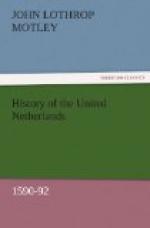Accordingly the attention of the Sixteen had been directed to President Brisson, who had already made himself so dangerously conspicuous by his resistance to the insolent assumption of the cardinal-legate. This eminent juris-consult had succeeded Pomponne de Bellievre as first president of the Parliament of Paris. He had been distinguished for talent, learning, and eloquence as an advocate; and was the author of several important legal works. His ambition to fill the place of first president had caused him to remain in Paris after its revolt against Henry III. He was no Leaguer; and, since his open defiance of the ultra-Catholic party, he had been a marked man—doomed secretly by the confederates who ruled the capital. He had fondly imagined that he could govern the Parisian populace as easily as he had been in the habit of influencing the Parliament or directing his clients. He expected to restore the city to its obedience to the constituted authorities. He hoped to be himself the means of bringing Henry IV. in triumph to the throne of his ancestors. He found, however, that a revolution was more difficult to manage than a law case; and that the confederates of the Holy League were less tractable than his clients had usually been found.
On the night of the 14th November; 1591; he was seized on the bridge St. Michel, while on his way to parliament, and was told that he was expected at the Hotel de Ville. He was then brought to the prison of the little Chatelet.
Hardly had he been made secure in the dimly-lighted dungeon, when Crome, a leader among the Parisian populacey made his appearance, accompanied by some of his confederates, and dressed in a complete suit of mail. He ordered the magistrate to take off his hat and to kneel. He then read a sentence condemning him to death. Profoundly astonished, Brisson demanded to know of what crime he was accused; and under what authority. The answer was a laugh; and an assurance that he had no time to lose. He then begged that at least he might be imprisoned long enough to enable him to complete a legal work on which he was engaged, and which, by his premature death, would be lost to the commonwealth. This request produced no doubt more merriment than his previous demands. His judges were inflexible; and allowed him hardly time to confess himself. He was then hanged in his dungeon.
Two other magistrates, Larcher and Tardif, were executed in the same way, in the same place, and on the same night. The crime charged against them was having spoken in a public assembly somewhat freely against the Sixteen, and having aided in the circulation in Paris of a paper drawn up by the Duke of Nevers, filled with bitterness against the Lorraine princes and the League, and addressed to the late Pope Sixtus.




